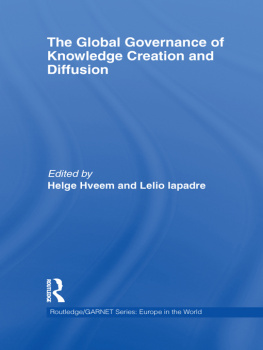First published 2004 by Transaction Publishers
Published 2017 by Routledge 2
Park Square, Milton Park, Abingdon, Oxon OX14 4RN 711
Third Avenue, New York, NY 10017, USA
Routledge is an imprint of the Taylor & Francis Group, an informa business
Copyright 2004 by Taylor & Francis.
All rights reserved. No part of this book may be reprinted or reproduced or utilised in any form or by any electronic, mechanical, or other means, now known or hereafter invented, including photocopying and recording, or in any information storage or retrieval system, without permission in writing from the publishers.
Notice:
Product or corporate names may be trademarks or registered trademarks, and are used only for identification and explanation without intent to infringe.
Library of Congress Catalog Number: 2003047312
Library of Congress Cataloging-in-Publication Data
The governance of knowledge / Nico Stehr, editor
p. cm.
Includes bibliographical references and index.
ISBN 0-7658-0172-8 (cloth : alk. paper)
1. Knowledge. Sociology of. 2. ScienceSocial aspects. I. Stehr, Nico.
BD175.G65 2003
306.42dc21
2003047312
ISBN-13: 978-1-4128-6409-1 (pbk)
ISBN-13: 978-0-7658-0172-2 (hbk)
Preface
Anxieties and concerns about the social consequences of new scientific knowledge and novel technologies are not new. Nor are elusive promises of the plain blessings of science for humankind and the mitigation of human suffering that scientific advances entail. But a persuasive case can be made that we have reached a new, modern stage. The first controlled genetic experiment did not occur until 1972. The first human being conceived outside a womans body was born in 1978. The controversial discussions of recombinant DNA, embryonic stem cells, genetically modified foods, the prospects of lethal and nonlethal biotechnology weapons, genetic engineering of the human germline, the neurosciences, the reconstruction of the genome of the ancestor of the human being, neurogenetics, and reproductive cloning exemplify some of the novel issues we are confronting in vigorously contested debates (see also the essay by William Leiss, in this volume). Concerns about the societal consequences of an unfettered expansion of (natural) scientific knowledge are raised more urgently and are moving to the center of disputes in society and to the top of the political agenda. Governments will have to engage in new political activity and will be held accountable to new standards. Public conflicts, friction, and disputes over the implementation of knowledge, seen by at least some as attacks against science, will no longer mainly take place a posteriori.
For it is no longer uncommon that the discussion of the role of new scientific knowledge in modern societies leads to demands that such knowledge and its impact be regulated, managed in some way, or even suppressed. The question has now become pertinent (and these concerns are not merely prompted by the possible consequences of nuclear science and technology anymore), how can we avoid being devoured by a marvelously powerful science? It would be too easy to dismiss calls for intervention as irrational or antimodern responses. The concerned questions being raised and the resistance being mobilized refer back, of course, to the image that we have of ourselves, according to which we are arranging our lifean image that appears to be under threat.
But what knowledge needs to be regulated, and whose responsibility is it? And what knowledge do we require in the context of regulative knowledge politics? Do we need to regulate new scientific knowledge as closely as, or even more strictly than, one regulates, say, traffic? If not, on what grounds? If so, for what reasons, and protecting what interests? If strict restrictions apply, could absolute prohibitions (for example, outlawing human germline gene therapy) be enforced? Is knowledge about to become a private good (again)? What will be the identity of some of the major actors involved, and how will knowledge politics be organized?
We are interested in the bases of the approaches and clashing perspectives in debates about the policing of knowledge, as well as the methods and chances of regulating new knowledge in modern and increasingly fragile societies. Crucial to the possibilities and limits of knowledge politics are dynamic social, cultural, political, and economic settings, often at the macro rather than micro level, such as laboratories, theories, and experiments. The context-specific matrix changes rapidly; for example, as a result of the loss of power of large, modern societal institutions such as the state, the church, corporations, and science. Yet large social institutions continue to present themselves, despite their growing weaknesses, as systems of effective societal control. Robust scenarios for knowledge politics are difficult to generate and are not at all obvious. The burden of this study is nevertheless to show how and why knowledge politics are set to emerge as an arena of signifi-cant political activity and choices; and that much can be anticipated. Knowledge politics will have a major impact on what future societies will look like.
Acknowledgments
With a single exception, all the papers included in this anthology were first presented at a conference of the Kulturwissenschaftliche Institut (Center for Advanced Cultural Studies) in Essen, Germany, 57 September 2001. I am very grateful to the Institut, its director, Professor Jrn Rsen, for inviting me to become a fellow of the Kulturwissenschaftliche Institut, and for supporting the international conference on The Governance of Knowledge. I am indebted to Professor Michael Polanyi of the University of Toronto who opened the conference in Essen with a stimulating discussion of the Governance of Science. My sincere thanks also go to Dr. Norbert Jegelka, the executive director of the Institut, his great enthusiasm and usual facility to smooth administrative hurdles. We all benefited that Doris Alemara of the Institut made sure that the conference was well organized in all its many details and that the participants felt at home in the Kulturwissenschaftliche Institut. Finally, I have to thank Robin Taylor who took it upon herself to copyedit the manuscript with her familiar efficiency and care.
Nico Stehr
Contents
Preface
Nico Stehr
Introduction: The Emergence of Knowledge Politics
Nico Stehr
Introduction
Reiner Grundmann
1 Knowledge Policy as the Task of Science: On Ethically Relevant Knowledge of Nature
Gernot Bhme
2 Traditional Knowledge in Modern Society
Wolfgang van den Daele
3 In Search of Vehicles for Knowledge Governance: On the Need for Institutions that Creatively Destroy Social Capital
Steve Fuller
Introduction
Martin Schulte
4 The Rising Relevance of Non-Explicit Knowledge under a New Regime of Knowledge Production
Werner Rammert
5 Policing Society: Genetics, Robotics, Nanotechnology
William Leiss










